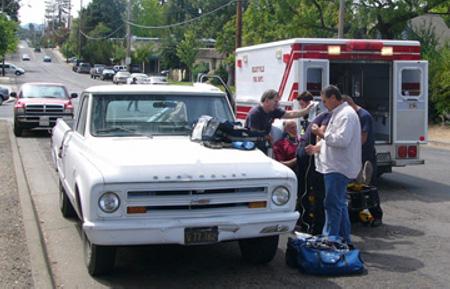- Elizabeth Larson
- Posted On
Governor signs gaming compact with Habematolel Pomo
On Wednesday, Gov. Arnold Schwarzenegger announced that he had signed a gaming compact with the 210-member tribe, an important step in clearing the way for the new gaming facility, which will be located on Highway 20 next to the Upper Lake County Park.
“I am pleased we were able to reach an agreement with the Habematolel Pomo of Upper Lake that benefits the members of the tribe as well as the local community and the state,” said Schwarzenegger.
Tribal Chair Sherry Treppa Bridges said the new casino will have 349 slot machines, six table games, sitdown and fast food restaurants, and a retail shop in a roughly 34,000-square-foot facility, with about 175 employees.
But if the tribe wants to break ground on its new $25 million casino this fall in time for a scheduled spring opening, they must still receive the Legislature's approval, Bridges said.
Bridges said the tribe believes it has a legislative sponsor who will work to get the matter before the Legislature before its last day of business for the session, which is Sept. 11.
After the tribe's land was received into federal trust last fall, the Habematolel immediately began the compact negotiation process, Bridges said.
The 112-page compact Schwarzenegger signed with the Habematolel this week – which has an additional 111-page appendix based on federal regulations for internal gaming controls – follows a blueprint similar to other recently negotiated compact, according to Schwarzenegger spokesman Jeff Macedo.
The compact will run through Dec. 21, 2030, and allows a maximum of 750 slot machines at one gaming facility. Under the compact's terms, the tribe will share 15 percent of annual net win revenues with the state.
Macedo said recent compacts have varied in how they've determined how much of the gaming proceeds will go to the state. The 2004 compacts varied between different options, including per-device fees and two-tier systems.
He said each compact is negotiated as a package. “Each one is negotiated on a tribe-by-tribe basis,” Macedo said.”
The Habematolel's compact provisions calls for binding arbitration before a retired judge for disputes over patron injuries and gambling; environmental protections including a requirement that the tribe prepare an environmental impact report and negotiate mitigation of any off-reservation impacts with the county; the right for employees to collectively bargain; the participation in the state's worker’s compensation system and unemployment insurance program, compliance with federal and state occupational health and safety standards, and enhanced employment discrimination provisions.
In addition, the tribe has agreed to comply with standards that meet or exceed the federal National Indian Gaming Commission standards, will meet or exceed the California Building Code and Public Safety Code and address issues of problem gambling through training, advertising and signage.
The tribe also has agreed to pay into the state's Revenue Sharing Trust Fund when it operates over 349 slot machines. That fund provides $1.1 million annually to each of the state's non-gaming tribes.
County Administrative Officer Kelly Cox credited the tribe for its proactive approach to working with local government. “The tribe went out of their way from day one,” Cox said.
He said the Habematolel and the county have worked out a memorandum of understanding that will help cover law enforcement, traffic, fire and emergency services and more. The agreement was entered into in July of 2006.
“We didn't want them to pay any more than they would have to pay if they were a private business,” said Cox.
The tribe won't be paying taxes, but instead has agreed to an in-lieu contribution that would be an amount equivalent to the property tax value of their 11-acre site, Cox said.
The Habematolel also have agreed to pay a small contribution to the county's marketing department until they build a lodging facility, at which time they would pay an amount equal to the 9-percent transient occupancy – or bed – tax paid by accommodations, he said.
In addition, the tribe has contributed $378,000 to the Lake County Sanitation District, as Lake County News has reported.
Cox said those funds were used for capacity expansion in the Upper Lake area, which was needed regardless of whether or not the casino is built.
Bridges said tribal leaders have been extremely busy in recent weeks, trying to facilitate the necessary work in the Legislature.
Thursday was the last day to get a bill gutted and insert the language approving the compact, and Bridges said it was going to take some maneuvering to get it quickly through committees and to the floor of the legislative houses.
On Monday, when they started discussing the need for the bill with legislators, Bridges said they weren't totally welcomed. However, she added, “We have made some major movement in at least getting through the process.”
The tribe has other work to do in a short amount of time, including completing a few more steps before finalizing its environmental impact report on the casino, said Bridges.
“We expect to open the doors next spring,” said Bridges. “We're targeting May. We've got a very aggressive schedule.”
The groundbreaking is expected this fall, and the building will be handled by the general contractor that did Twin Pine Casino's major expansion, Bridges said.
To view the compact and related appendix please visit http://gov.ca.gov/pdf/press/2009UpperLakeCompactFinal.pdf and http://gov.ca.gov/pdf/press/2009UpperLakeCompactAppendixA.pdf .
E-mail Elizabeth Larson at This email address is being protected from spambots. You need JavaScript enabled to view it. . Follow Lake County News on Twitter at http://twitter.com/LakeCoNews .









